 Find the best pressure washer soaps, detergents, and chemicals with our detailed reviews and buying guide
Find the best pressure washer soaps, detergents, and chemicals with our detailed reviews and buying guide
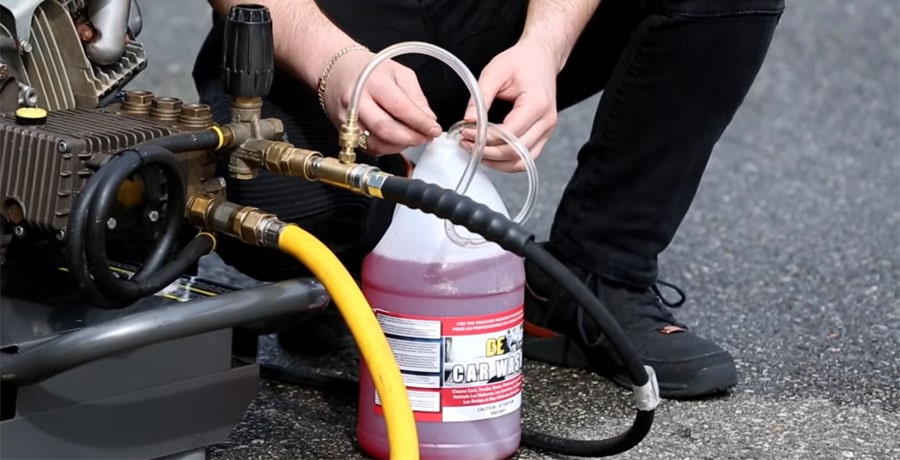
Soaps and detergents for pressure washers are not created equal. And you can’t just use any cleaner you come across. But the combo of soap and water spray is a double whammy for grime. Just ask your dishwasher. Whereas your dishwasher has the advantage of hot water, most pressure washers don’t. They make up for that with high pressure spray. Add soap to the mix, and you can speed up cleaning tenfold.
But what’s the difference between power washer soap and detergent
Surprisingly enough, soap and detergent are not interchangeable. Real soap is derived from natural ingredients (like fats & oils) while detergents are made from synthetic substances (like carbonic compounds). Most of the “soaps” you use today are actually detergents.
When should you use pressure washer soap?
Since pressure washer soap is made of biodegradable ingredients, it will cause no harm if washed down storm drains. Some communities may have strict laws regarding that, which is why you’d want to stick with natural soaps when cleaning outdoors. Keep in mind that soaps mixed with hard water or collected rainwater may form calcium carbonate deposits that will get left behind on the surface you’re cleaning.
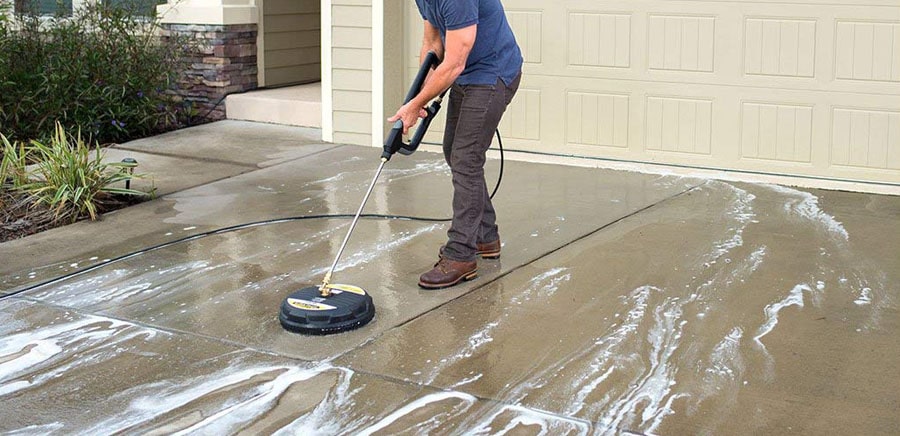
When should you use pressure washer detergent?
If there aren’t strict laws about water runoff, and you have years of built-up grime or stuck on dirt, you’ll want to go for a detergent. Detergents are stronger than natural soaps. They’re great for getting into porous surfaces you want to pressure wash, such as wood and concrete.
Can you use dishwashing liquid instead?
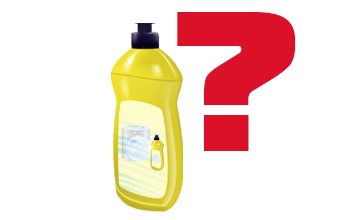
Avoid using dish detergents like Dawn and other household cleaning liquids because they’re not formulated to handle the high pressure spray and inner workings of a pressure washer. Those are designed specifically for removing grease and proteins left from food.
If at all possible, use only soaps and detergents designed for pressure washers and also for the type of cleaning (e.g. mildew or tree sap removal) and type of surface you need to clean (e.g. concrete or siding).
What Do I Look For In A Pressure Washer Detergent?
Choosing the right pressure washer soap or detergent can be confusing, and there are several factors to consider when choosing the right product for your home. Some of these factors include;
- What You’re Cleaning
Depending on the stain you’re attempting to break down and the surface it’s on, a container of natural soap or a strong synthetic detergent may be the best option. In some instances, a hybrid may even be best. - How Big The Mess Is
Depending on the total surface area you’re attempting to clean, you may want to consider opting for a more concentrated product to help get you through the job. - What The Product Is
As mentioned, depending on the job at hand and the machine you’re using, soap may be the best option, while a detergent may be better for others. - Volume Of The Product
Something important to consider is the total overall amount of product you’re getting, and whether the contents of that volume are concentrated or not. These factors can greatly influence the overall value of a product. - Price Per Fluid Ounce

This is a simple way to determine the basic value of the product you’re getting, where generally, the lower the cost per fluid ounce, the better financial value that product provides. However, it’s important to remember that cheaper doesn’t necessarily mean better.
Top-Rated Power Washer Soaps & Detergents: 2023 Ratings & Reviews
We select, test, review and suggest the best products. We may earn a commission, if you buy something through our links.
Why you can’t use regular soaps in pressure washers
Pressure washers are a bit finicky in that they require special soaps and detergents. Regular soaps such as laundry, dish, or household cleaners are not formulated to withstand the high pressure a power washer delivers.
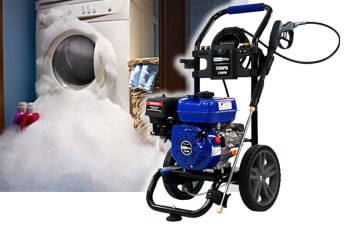
Think about a jacuzzi tub. If you’ve ever accidentally poured bubble bath in while the jets are on, you probably witnessed a fast-moving avalanche of suds that flowed over the sides of the tub. A similar thing can happen if you use a regular laundry detergent in a high efficiency front-loader. It’s the same concept. Specific cleaners are designed for the specific pressures and velocities of specific appliances.
So, when looking for a pressure washer soap or detergent, make sure it’s one designed specifically for pressure washers. Many of them can be used with any pressure washer, but be sure to check your pressure washer owner’s manual to see if the manufacturer recommends any specific cleaners and to see the recommended amounts.
The better you follow the recommendations, the longer your pressure washer will last.
What chemicals are used in pressure washer soaps & detergents?
There are 3 basic terms you’ll see thrown about on labels and product descriptions. Here is a very basic rundown of what they’re for.
- Cleaners – Dirt removal
- Sanitizers – Quickly (less than 30 seconds) kill up to 99.9% of bacteria
- Disinfectants – Kill ALL microorganisms within 10 minutes
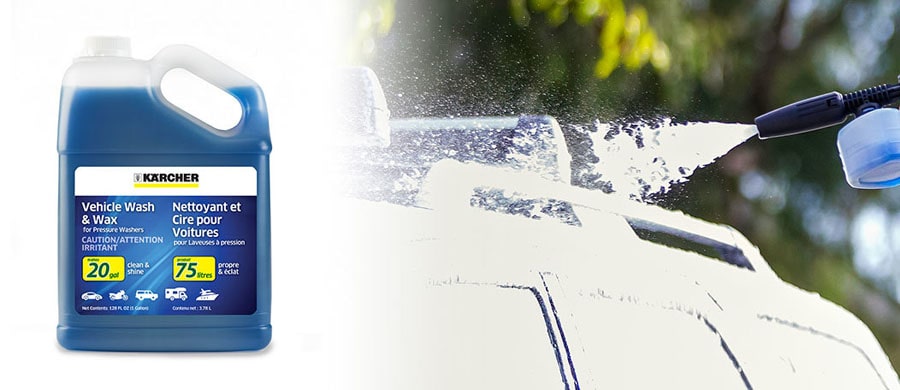
This is a list of chemicals you’ll see on many pressure washer cleaners & their general intended purposes:
- Citric acid – Removes stains from concrete and wood
- Oxalic acid – Removes rust & other stains
- Vinegar – Very gentle cleaning for kitchen surfaces, windows, even fresh produce. Polishes brass, neutralizes odors, safe for pretty much any surface
- Sodium hydroxide – May be called “caustic”. Quickly dissolves fats, oils, and grease on glass, steel and other surfaces.
- Sodium hypochlorite – Strong disinfectant & stain removal
- Bleach – Mix of sodium hypochlorite & sodium hydroxide. Very effective sanitizer & disinfectant. Ideal for mildew and mold removal
- Ammonia – Great for glass and stainless steel
- Potassium hydroxide – Essential in making soft or liquid soaps
Concerned about exposing your garden plants, waterways, pets, & kids to cleaners?
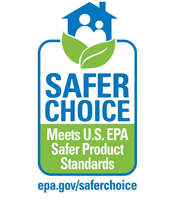
Well, you’re in luck. Many pressure washer cleaners are now biodegradable and won’t hurt your lawn or landscape plants. Several are actually endorsed by the EPA as a “safer choice” so they won’t harm wildlife or waterways. Some are even orally non-toxic so they won’t hurt your child or pet if they were to ingest them.
Look at the labels. The safety status should be easily visible. If in doubt, you can always contact the manufacturer or get hold of the MSDS sheets for detailed ingredients and their risks.
What about homemade pressure washer soaps and detergents
We get it. You’re concerned about costs and green living. But…we can’t recommend making your own pressure washer soap or detergent for a few reasons. One being that there are so many great choices already on the market that are environmentally friendly.
Also, by the time you gather up separate ingredients to mix up your own cleaner, you won’t be saving much money and certainly won’t be saving time. A jug of concentrated cleaner isn’t that expensive and goes a long way. Some of them make up to 30 gallons or more of cleaning solution.

Lastly, as we stated above, pressure washers require specific cleaners and dilutions that you may not be able to replicate at home. If any measurement is off, you risk damaging the pump and inner workings. Most likely, your warranty won’t cover any damage incurred from using an unapproved cleaner.
That’s not to say you can’t use a little homemade remedy to help the cleaning process. Think pre-cleaning. Use an undiluted white vinegar to spray on mildew and mold stains before you clean with the pressure washer. Let it soak or scrub it in, then clean with the pressure washer. You may not even need soap, and it’s totally safe for the environment.
Pre-treating with a bleach solution is also an option, though you have to be careful around plants and shouldn’t let it soak into the soil. It’s best to cover the area below with a tarp if you’ll be using bleach. But for stain and odor removal, killing mold and mildew, and disinfecting, bleach is the king.
Whatever you decide to use, don’t be afraid to try different soaps and detergents, different dilutions, and different application methods. It may take some trial and error before you find what works best for your cleaning needs.
How Do I Decide What’s Right For Me
The best thing you can do when choosing the right cleaning product for your gas or electric pressure washer is to research your own specific model and check the manufacturer’s recommendations, as well as brands tested by owners who have verified the efficacy of the product themselves.
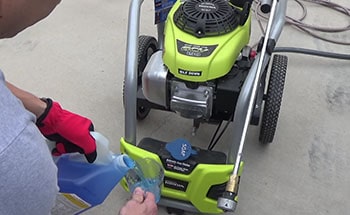
While someday we hope to have specific product recommendations for every model we review, the amount of additional research and testing that would need to be required per review would increase exponentially. So for this, you may want a bit of searching yourself.
While products formulated for pressure washing should work across all models, both gas and electric, certain batches may perform better on certain models, under specific pressures, and on different surfaces. However, this doesn’t mean that if you don’t choose the perfect product for your machine that you’re going to have a problem or that it’s going to damage your unit.
If the product is formulated as a pressure washer detergent or soap, even if not specifically recommended for your model, it will not harm your machine at all. It just may not perform as optimally as a different detergent or soap better suited for your specific pressure washer.
No matter your choice, by investing in a pressure washer and the proper products to go with it, you’re making a substantial investment in your home, your time, and yourself. After all, your time is valuable, so why spend it straining to clean? The right pressure washer and pressure washer detergent can truly make life much easier.
Your Location (rating adaptation): Worldwide | United States | Canada

Pressure Washer Tips & Tricks
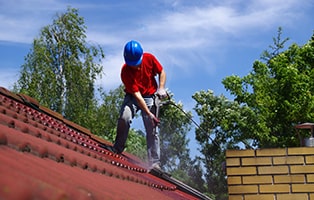
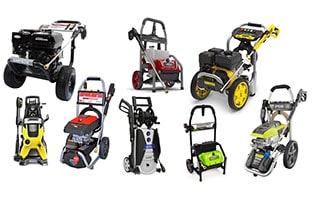
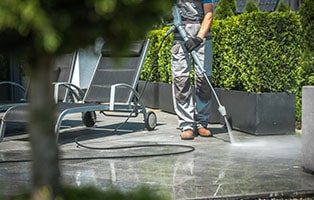
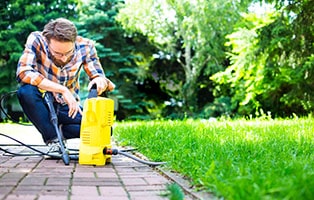
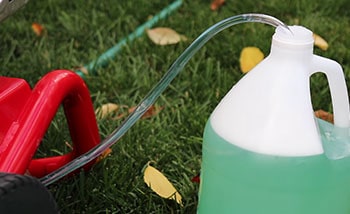
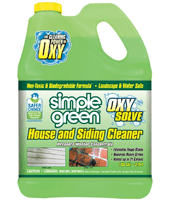


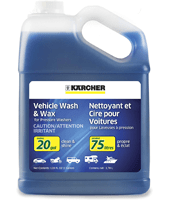
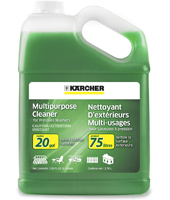
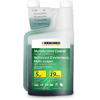
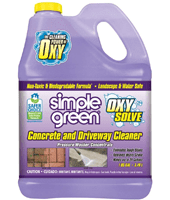
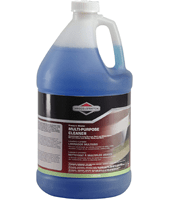
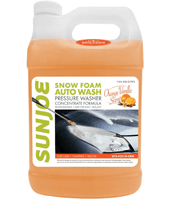
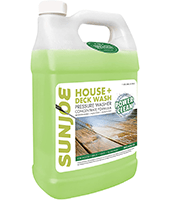
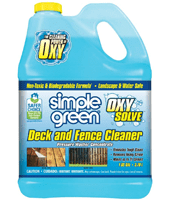
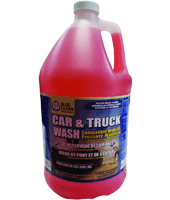
Thank you so much! I was just sitting here reading the manual on my new pressure washer. Not knowing what PW safe soaps are I then found your article on safe cleaners! I was hoping for simple green and vehicle safe options listed. My vehicle is always embarrassingly filthy because I actually use my 4×4 on my hilly farm. Now I hope to keep things a bit cleaner and become an expert user with the PW on the regular.
I live near a river. Will it be okay to use Simple Green Total Outdoor Cleaner under these environmental conditions?
How’s it going, Roberta? It’s okay to use if you’re not pouring it directly into any bodies of water. That’s because this product meets the stringent standards for outdoor use designed to protect aquatic life and sensitive environmental areas. I hope this was a satisfactory answer!
Thanks for sharing this blog post. I have read this post thoroughly and would appreciate the idea you have shared with us.
Hi Alex. I see that on the picture there is a fitting that sucks up soap from the bottle due to water pressure. What does that piece of fitting called? Thanks.
Down scream injectors. Put hose in jug and your pressure does the work. Only works with your black or blue tip. Must be hooked to where your water goes into your pressure hose.
Thanks for your insite ( lol, spelling)
Alex. You answer questions the average person can understand.
Unlike Bob Villa who’s reviews are just
Extra income for him.
He knows everything. So much so he needs to try and get back on this old 🏚
I bet Norm Abrams knows more about pressure washer soaps! Lol, thanks again.
Will this work with a surface cleaner attached to a pressure washer?
No wrong tips on jets. Have to use with your gun and blue or black tip then surface cleaner
Why should I use a detergent specifically designed for car maintenance?
We all love our cars—and we want them to stay as shiny and beautiful as the day they left the lot. Part of this comes from using detergents that are specifically formulated for the paint itself as well as the topcoat. Some types of cleaning components can damage the topcoat, and it’s essential to be careful to wax your car after cleaning. Fortunately, a few of these formulations include a 2-in-1 wax coating.
What a great discussion!
We are about to purchase a low-cost pressure washer for light jobs and know NOTHING about the washers or the cleaners
Your discussion is great and seems very thorough
(I was a biology + chemistry major back around the industrial revolution and appreciated the reminder about the chemistry and physics involved in the way these solutions work and flow through these pumps. I am TOTALLY the kind of person who would be likely to say, “I’ll just try some reeeeeally dilute DAWN! What could go wrong? After all . . . I’M A DOCTOR!”)
We’re going to look into the Simple Green brand
We also are going to bookmark your name and check back with other questions 😀
I’m looking for a powerful pressure washer detergent for concrete and houses
Nice article. I have studied chemical mostly truck wash, car wash, degreaser ect. If you would like to contact me, feel free to.